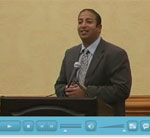Halifax Job Search Strategies Forum Report
Preparing for Interviews—What Recruiters Look For
| Video |
 |
Kamran Nisar, District Manager of Professional Services, Walmart Canada
Many people do not know a lot about interviews and how to prepare for them, said Kamran Nisar.
“None of you would write a test or give a speech without preparing.” The first thing a prospective applicant should do is research. Reading newspaper articles and looking up the company’s website will provide the applicant with details about that company and its history.
“A motto we used in science is that if you don’t know something, you haven’t researched enough,” Nisar said.
Preparing for the interview is essential; applicants should practice answering questions they anticipate being asked at the interview. Some companies will forward interview questions beforehand. Talk to a colleague who works at the company about the job duties and responsibilities for that position.
There are three important steps when preparing for an interview:
- Practice answering possible interview questions beforehand.
- Know yourself, your resumé, and your skills.
- Make sure your resumé is accurate, and review it the day before the interview.
The job interview is a two-way process.
“Interviewees should ask questions about the company in the interview,” Nisar said, but should also be aware that the person conducting the interview might not have a human resources background. An applicant should come with a list of questions about the position.
“Ask why the interviewer works for the company. This is a chance to interview the company about what they do, and the position,” said Nisar. Most people recommend asking the recruiter no more than three to five questions in an interview.
Preparing an interview wardrobe is also important, said Nisar. Some people suggest dressing one level above the company dress code, but he recommends dressing at the level of the job. He said he once “dressed a level up” for an interview, only to discover that it was casual Friday.
Applicants should find out the kind of interview they will be attending. Knowing the different types of interview and what to expect from the process will work to the applicant’s advantage.
The exploratory interview is often the first in a multi-interview hiring process, and is mainly about information gathering, said Nisar.
A behavioral interview includes questions that require a specific example or anecdote, such as “Have you ever worked in a pharmacy with patients who are too rushed to be briefed on the prescription? How would you deal with that situation?”
In a panel interview, several interviewers represent different areas of the company, whereas a group interview might involve several candidates vying for a number of different positions.
Informal interviews are unstructured and involve “get to know one another” discussions. These interviews are usually the last stage of a multi-interview process. Nisar said he prefers to conduct structured interviews with a preset list of questions so he can look back at each interview and compare answers.
When answering situational or behavioral questions, Nisar uses the mnemonic device STAR: situation, task, action, and result.
“Don’t answer questions in a rush. Ask for clarification if needed, and don’t be afraid of pauses and silences,” he said. Feel free to give examples of situations that did not go well, but be sure to explain what was learned from the situation.
“Remember that you are interviewed from the moment you get in the door to the moment you leave. Some jobs have been won or lost based on the chit-chat that happens on the way out the door,” said Nisar.
He listed his interviewing tips for prospective applicants:
- Show interest in the company; be engaged and confident.
- Bring an extra pen and paper, and resumés.
- Do not bring food, beverages, or gum, although water is acceptable if it is needed.
- Take notes throughout the interview.
- Give specific answers.
- Do not interrupt the recruiter during the interview.
- Send a thank you to the interviewer.
Get to the interview early, but not too early, Nisar said. If lateness is unavoidable, notify the interviewer by phone or email. He also suggested applicants bring printouts about the company to the job interview, and have an idea of their expected wages.
Disclosing a disability is a personal choice, said Nisar. “You don’t have to disclose before the interview, or even after, or ever.” If applicants decide to disclose, they should take the opportunity to educate the employer.

 Quick Question:
Quick Question:

